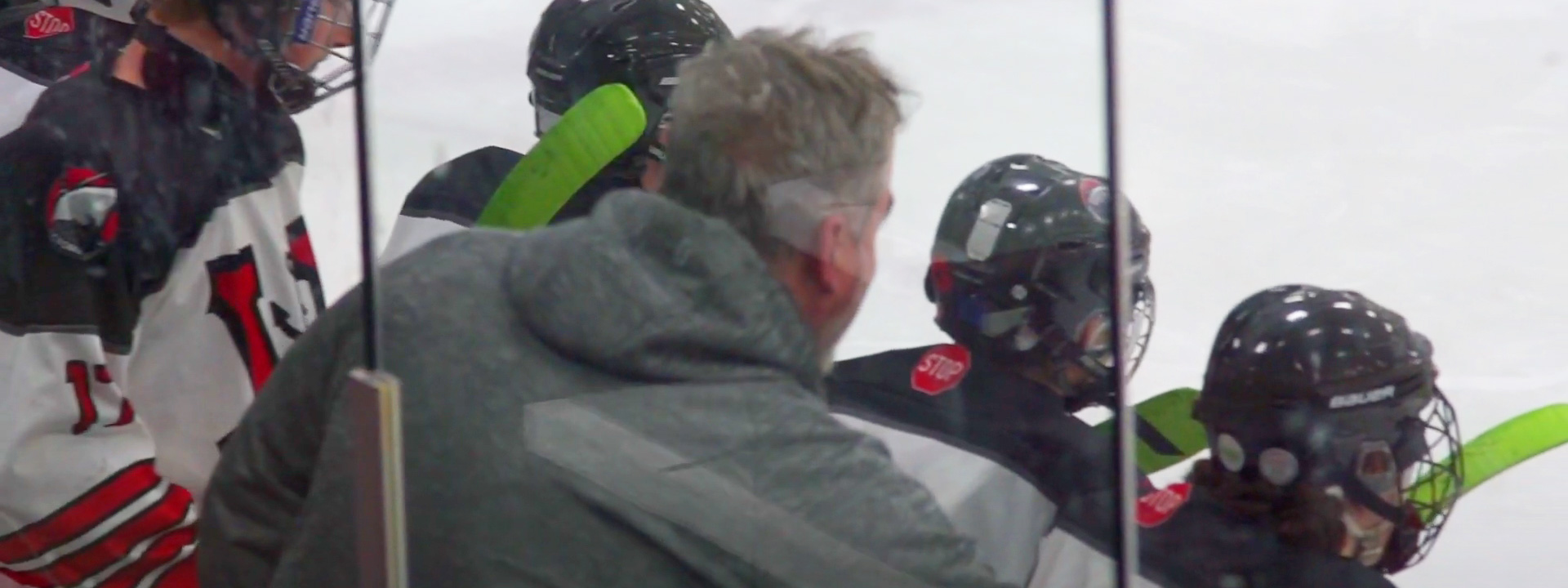Our Son’s Hockey Journey- How Buddy Check for Jesse transformed his Journey
Our son, who has been playing hockey since he was 5 years old, is like most other young hockey players where the sport has grabbed him and it consumes his life in a positive way. Our son’s hockey passion has also positively impacted the rest of our families’ lives despite the number of hours it has consumed over the years. Our son is a very active and happy 14 year old with many friends, a supportive family, and many interests both in and out of school. He remains connected to a large circle of hockey friends and past teammates.
This year we relocated to a new town. Our son started with a new hockey team, a new group of friends, a new school and a new coach. The year started well, however we missed some small signs that there may have been something going on with our son’s mental health. After a few weeks, he started to spend more time at home and talked less about his hockey experiences. We could see that he was a little more “stressed”; however we all chalked it up to the changes we had experienced in the past few months.
After a few more weeks, our son expressed some challenges with his new hockey program to both his mother and me. He relayed to us that him and a couple of the players on the team seemed that they “couldn’t do anything right”. He felt he was targeted by the coach during video review and in team meetings where constructive feedback was replaced by negative criticism on his character and that he couldn’t ask questions during instruction on the ice or in video review without feeling humiliated and talked down for asking for clarification.
He was approached by team members after a few practices and video review sessions asking him “why are the coaches being so hard on you” and received texts from teammates saying “don’t know why they were on your case today, just forget about what the coaches said.” It reached a tipping point where feedback seemed to change into personal attacks on his character and ability as a hockey player rather than any attempt to help him and the team develop in a positive way.

One night he came home upset after a long practice. He told us that he did not want to play hockey anymore, after being his passion for the past 9 years. He didn’t even want to go to the weekend tournament. His mother and I offered to connect with his coach, however, he was adamant that we not speak with his coach. So, we worked out a couple communication strategies and quick responses he could use with his coach as he was uncomfortable having a big conversation with him.
Not much time passed and once again he came home and wanted to quit hockey and now he also did not want to go back to the school where his coach held other roles. He held his conviction that we not speak to his coaches as he felt everything would just get worse. I wrestled with how to approach this situation as I could see changes in our son’s energy, his enthusiasm toward hockey dimmed, and his humour and lightness turned heavy. We watched him closely, kept the conversation open, while struggling with how to respect his wishes and guide him through this situation. With all good intentions, the strategies he implemented were unsuccessful. I decided to take a different approach and introduce the general topic of mental health with the coaches in which he agreed. So, I asked the coaching staff about their knowledge on the “Buddy Check for Jesse” program. It turned out that it was the bridge that started the conversation about our son’s experience.
After the next home game, our son came out to speak with us and his eyes were full of tears. He recognized that things hadn’t changed and he needed our help.
I approached the coach and opened a conversation regarding Buddy Check for Jesse and the connection with the mental health of his player on the team. I asked him specifically about whether he had noticed any changes in our son in the past few weeks. He acknowledges that he had noticed changes and explained a couple things he had recognized. I then let the coach know how his communication has been impacting our son. I explained how our son had been feeling and how he has interpreted and internalized the “feedback”.
In my mind, this was an “all in move” that was a little scary even for a 48 year old adult. I did not know if this would end his hockey season or if new lines of communication would be established. I told his coach that our son did not feel safe with him as his coach and he wanted to withdraw from hockey and school.
I am not sure what I was expecting as a response from the coach by putting him on the spot but I must say I could not have even imagined such a heartfelt apology and deep emotional response our son received from the coach. It was more than the words that he tried to articulate in response.
It was his body language, the look on his face and the tears in his eyes that told me he cared about his impact that he was having on the kids and our son. We went on to have a good talk about intent of the message being delivered and how it was being perceived and internalized by our son. The coach said he had never received feedback of this nature in his coaching career. He was not aware of the impact of his coaching style.
The coach asked to have a meeting later that night with me and our son. Although I know he was going to be scared and very uncomfortable in the meeting, it was important to me that our son was able to articulate his feelings and his perspective on the impact the coach had on him in a safe environment. It was important to me that our son knew that I heard him and that I cared about how he was feeling. But the most important thing, above all, was our son’s mental health.
When our son found his voice, he told the coach that he felt intimidated by him, that his constructive feedback provided in front of his peers was humiliating, that his teammates feeling the need to reach out and dismiss the coaches remarks was embarrassing, and that he lost his passion for hockey. It was also important to me to give the coach the opportunity to respond and reflect and communicate directly to our son.
The coach provided a heartfelt apology and had tears in his eyes when he spoke to our son. The conversation was extremely productive and opened up new lines of communication that the coach would support between the Captain and Assistants on the team to check the temperature of the players and their mental health. The coach went on to sign up for a Mental Health first aid course and read a book that we provided him Dare to Lead.
We could not have asked for a better coach for our son and he is thriving once again in hockey, at school and with his friends. We have also heard positive stories from other players on the turnaround they have seen for their own kids on the team.
B.U.D.D.Y check for Jesse helped turn a concerning situation into a positive experience.
Behaviour: I noticed that our son was behaving differently towards hockey. He had lost enthusiasm for his favourite sport.
Uncomfortable: Our son voiced that he felt unsafe and uncomfortable sharing his feelings directly with his coach.
Depressed: I noted that he was withdrawn and he was not his regular happy-go-lucky self.
Different: Others, including his teammates and his coach, noticed that there was something different about him, he wasn’t the same kid.
You: Thankfully, he knew he was not alone and he reached out to us for help. He needed help expressing and processing his feelings.
The response from his coach turned out to be a positive life lesson. His coach demonstrated the humility in that he was always learning ways to be better, the commitment to change, and the consistency of checking in with our son and all the other teammates in the weeks following.
Thank you BUDDY Check for Jesse! #KeepTalking #BuddyCheckforJesse

